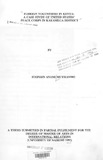| dc.description.abstract | The problems facing volunteer agencies are those of addressing their development objectives and administering their programmes e,ffectively. Often, there are conflicts between the national interests of governments who sponsor volunteers on the one hand,and the development objectives these volunteers intend to pursue on the other. The ideal of voluntary service is no longer the driving force behind volunteer programmes. They are a form of aid, a form of education and an instrument of foreign policy.
using the data collected on the United states Peace corps Volunteers in Kakamega District in Kenya, this study analyses the influence of political factors on international volunteer assistance. It also examines the role of volunteers in development.
The Peace corps was created in 1961 by the U.S. government to provide skilled manpower to deserving underdeveloped countries as a way of assisting them in their development efforts. In Kenya the first batch of Peace Corps volunteers arrived in December 1964. They were mainly involved in education and agricultural co operative development. Since then the Peace Corps has provided volunteers to Kenya every year.
This study argues that the Peace-Corps has played a political more than development role. Generally the programme has not been
ix
--
able to provide suitable skilled manpower to Kenya. However, due to the acute shortage of skilled manpower and resources at the grass root level, the Peace corps' role has had a positive contribution. The study further argues that a lack of committed administration of the Peace Corps volunteers, both from the Kenya Government and the Volunteer Agency undermines the effectiveness of the programme in the country. This ineffective administration of the Peace Corps programme is characterized by the following factors: lack of proper assessment of the need for additional manpower, absence of joined administration of the programme by the Government and Peace Corps/Kenya, and little or no support given to volunteers in the field in terms of information, funds, and tools of work.
This study concludes that volunteers play an important role in the diplomatic relations between Kenya and the united states of America. They also do contribute to the development of Kenya, especially in the short-term perspective. They provide the needed manpower at the grass-root level, where there is a shortage of skilled manpower and other resources. However, for the volunteers to effectively contribute to development, the programme should be administered efficiently. Factors such as relevant qualifications and skills, funds, the need for volunteers and their proper placement should be seriously addressed. | en |

